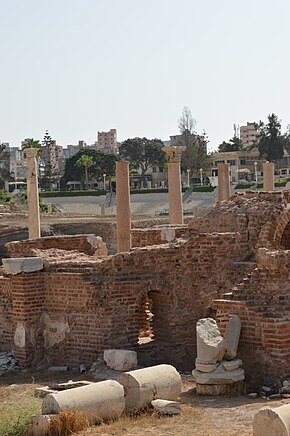
Back الفتح الإسلامي لمصر Arabic غزو العرب مصر ARZ موسلمانلارین میصر آلینماسی AZB Арабскае заваяванне Егіпта Byelorussian Арабско завоюване на Египет Bulgarian মুসলিমদের মিশর বিজয় Bengali/Bangla Conquesta àrab d'Egipte Catalan Arabische Eroberung Ägyptens German Conquista musulmana de Egipto Spanish Egiptoko konkista musulmana Basque
| Arab conquest of Egypt | |||||||||
|---|---|---|---|---|---|---|---|---|---|
| Part of the Arab–Byzantine wars | |||||||||
 Roman Theater in the city of Alexandria, Egypt | |||||||||
| |||||||||
| Belligerents | |||||||||
| Rashidun Caliphate | |||||||||
| Commanders and leaders | |||||||||
| |||||||||
The Arab conquest of Egypt, led by the army of 'Amr ibn al-'As,[1] took place between 639 and 642 AD and was overseen by the Rashidun Caliphate. It ended the seven-century-long Roman period in Egypt that had begun in 30 BC and, more broadly, the Greco-Roman period that had lasted about a millennium.
Shortly before the conquest, Byzantine (Eastern Roman) rule in the country had been shaken, as Egypt had been conquered and occupied for a decade by the Sasanian Empire in 618–629, before being recovered by the Byzantine emperor Heraclius. The Caliphate took advantage of Byzantines' exhaustion to invade Egypt.
During the mid-630s, the Romans had already lost the Levant and its Ghassanid allies in Arabia to the Caliphate. The loss of the prosperous province of Egypt and the defeat of the Byzantine armies severely weakened the empire, resulting in further territorial losses in the centuries to come.[2]
- ^ Sijpesteijn 2007, p. 440.
- ^ Haykal 1944, ch. 18